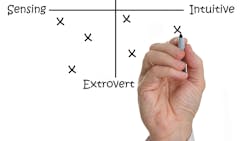Key Highlights
- Personality tests can help shops figure out of a candidate will fit their culture
- Shops can also reverse-engineer personality tests to see what qualities they value most for their business
When looking for the perfect technician (or even a pretty good one) to fill your shop's bays, it might be tempting to snap up any technician that can grip a wrench. Managers, though, are finding that good techs should not only have technical proficiency in diagnosing and repairing trucks, but also the social acumen to communicate issues with customers and navigate interactions with co-workers.
For instance, a technician might need to explain to a customer why fixing the root cause of a fault is better than simply replacing a faulty component, even if more costly. If done without the right amount of sensitivity and tact, the shop can upset and possibly lose a customer. And if the shop supervisor you hire can't respectfully and accurately convey instructions to techs, that creates a host of safety and efficiency issues.
What this really means is that maintenance personnel need soft skills, which, according to American Transportation Research Institute, is something 40% of trained technicians lack.
For more on technician hiring and retention:
However, personality tests present a way to help solve this problem by allowing shops to find and hire technicians that will mesh with their culture and their customers, allowing the shop to prosper.
Improving candidates and culture
The first thing to know is unlike the casual online personality tests that determine if you would be a Slytherin or Hufflepuff at Hogwarts, professionally conducted personality tests help employers identify applicant traits that determine how they learn and if they will or won't mesh with their shop culture. (Ok, so it's sort of like the Hogwarts test.)
To do this, most personality tests will pose questions and scenarios to gauge how the test-taker responds, helping to reveal their behavioral tendencies and/or emotional state. For shops, this can help them understand not only a candidate's current potential for the job, but also a look ahead at their overall career.
For instance, Mandy McWilliams, VP of finance and human resources at Bascom Truck & Auto explained that her shop uses a service called JOBehaviors, a company that provides tailored behavioral analysis for candidates based on the job they’re applying for. It provides assessments for diesel technicians, auto training candidates, bank tellers, electricians and carpenters, and more, ranking candidates based on their potential on a scale of 1-5 stars. According to McWilliams, they only hire those who rank 3 or more stars on the test.
“Psychological testing sounds intense, but it tests the likelihood that they are going to be happy as a diesel mechanic,” McWilliams said.
However, you shouldn't only rely on personality tests for your hiring practices. Bascom Truck & Auto certainly doesn't. Instead, they pair the personality test with a technical aptitude test, which ranks how a technician thinks instead of their overall knowledge of repair processes and diagnostics.
“If they think mechanically, we can teach them a lot of stuff,” said McWilliams. “If they don't think mechanically, we're going to struggle for the entire relationship that we have with them.”
Additionally, Peter Cooper, CEO of Ascend Consulting, has found personality tests to be helpful not just for hiring techs, but for leadership positions as well. He recalled one time when he had an applicant for a management position score all zeroes on his test. Feeling skeptical about the results, Cooper interviewed the applicant.
But during the interview, Cooper found that the candidate was "an emotional wreck," and not suited to a leadership position.
“He was never going to be the store manager," Cooper asserted.
Plus, beyond gauging if a candidate is right for a position, Cooper noted that having them do an initial personality test can create a good springboard for the later interview.
“That way, when you have an interview, you have something to talk about,” he commented.
Meanwhile, Jessica Wendt, owner of HM Repairs and Services, uses personality tests to not just determine if someone will fit her shop's culture, but to help employees interact with each other. To do this, she uses the DiSC Assessment.
“A DiSC assessment is an assessment tool that's going to help you learn how the individual communicates through how they think, act, and behave,” Wendt noted. “But really, [I use it to focus] on more of their communication style.”
For this assessment, each letter stands for a general personality profile, with ‘D’ standing for ‘Decisive’ or ‘Dominance,’ depending on who you ask, ‘I’ standing for ‘influence,’ ‘S’ standing for ‘Steadiness,’ and ‘C’ standing for ‘Conscientiousness.’ People with ‘D’ personalities tend to be confident and driven to achieve results, while ‘I’s tend to be more relationship-focused, ‘S’s are dependable on focus on cooperation, and ‘C’ folks focus on details, quality, and expertise, according to the company.
As for how Wendt applies this knowledge, she said that once they hire someone, whether a technician or a back-office worker, they’ll tape up a card with the person’s general personality report next to their workstation.
“What that does is it helps anyone going up to them to have a conversation,” she explained. For instance, while a ‘D’ type person might prefer to cut to the chase when assigning a task, an ‘I’ person might be more likely to ask about your family before getting down to business.
“When you talk about building culture within your team, if you know your people and how they like to be communicated with, your culture will grow,” Wendt concluded.
Do personality tests work?
But the elephant in the room is the question of whether or not these personality tests are accurate to begin with. To help with this, Bascom’s McWilliams pre-tested JOBehaviors with her husband.
“He's our service manager, and he said it was the stupidest thing he'd ever done,” McWilliams recalled. “But he scored as a five star, so while he thought it was a stupid test to take and couldn’t possibly tell me anything, it told me that he is going to be happy in this profession.”
Cooper did something similar, working backwards from personality tests to help refine and define his shop’s culture and expectations. First, he had his best technician take the test.
Then, “I literally gave that to my managers and said, ‘This is a good mechanic,’” Cooper said. “’This is what we want.’”
After all, “If you haven't established what good is, and you haven't established exactly what you want, how do you know you have it when that guy is sitting in front of you in an interview?” Cooper concluded.
About the Author

Alex Keenan
Alex Keenan is an Associate Editor for Fleet Maintenance magazine. She has written on a variety of topics for the past several years and recently joined the transportation industry, reviewing content covering technician challenges and breaking industry news. She holds a bachelor's degree in English from Colorado State University in Fort Collins, Colorado.
